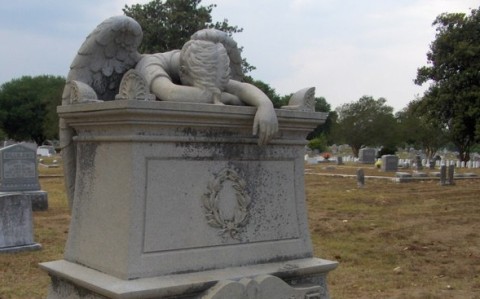Scenes of grief

News of Reynolds Price's death on January 20 prompted me to revisit several of my favorite books by him. Price taught at Duke University and wrote novels, poetry and essays that deal with religion and theological themes. Raised a Methodist in rural North Carolina, he called himself an "unorthodox nonchurchly believer." In Three Gospels, Price paraphrases Mark and John as well as his own gospel, "An Honest Account of a Memorable Life: An Apocryphal Gospel." In A Serious Way of Wondering: The Ethics of Jesus Imagined, Price reflects on Jesus and three moral issues: suicide, homosexuality and the plight of women in a male-dominated culture.
At the age of 51, when he was at the top of his game, Price was diagnosed with a life-threatening cancer of the spine. He was told that surgery and follow-up radiation might save his life but leave him a paraplegic—which they did. He wrote about his experiences in a book that I recommend to all ministers and physicians: A Whole New Life: An Illness and a Healing. Later, a lecture he gave at Auburn Seminary was published as Letter to a Man in the Fire: Does God Exist and Does He Care? In it, Price replies to a letter from a young medical student who has what appears to be a terminal disease; the student is asking the questions in the subtitle.
Read our latest issue or browse back issues.
Suffering is one of the constants in my four decades of ministry with four congregations. Innocent people suffer, babies are stillborn, bad things happen to good people. I don't think a week has gone by without someone asking what Price calls "the world's most frequent and pointless question in the face of disaster—'Why? Why me?'"
In this issue, Deanna Thompson describes how the traditional, well-meant responses to human suffering simply don't stand up to rational reflection. I learned this when I was only six weeks into my student pastorate. I had been to exactly one funeral—when I was seven years old—and had otherwise never been remotely close to mortality. But suddenly Johnny Johnson died, I was a pastor, and Pearl Johnson had collapsed in grief in my arms wailing, "Why? Why? Why?"
This or similar scenes of grief happen every day of every week. There are no simple answers. Thompson leads her students in discussion of the Christian perspective on suffering with the help of Daniel Migliore's Faith Seeking Understanding and its consideration of Christianity's contention that God journeys to the depth of human suffering in the death of Jesus.
In my work, I have been helped by people who have experienced terrible suffering and loss and have written about it thoughtfully and courageously: Martin Marty in A Cry of Absence, Nicholas Wolterstorff in Lament for a Son and Burton Cooper in Why, God? I keep those books close at hand. My experience is that a pastor/preacher needs to raise the subject, name it honestly and proclaim the gospel in the face of it.
Price had a vision of Jesus at the Sea of Galilee promising him forgiveness of his sins and healing. When he learned that he needed yet more surgery, he prayed: "Over to you: brace me for it—whatever it is—and thanks for the interesting overtime."






